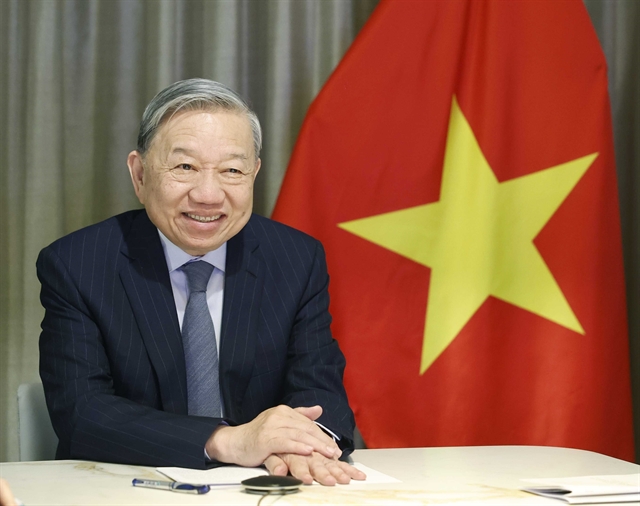 Politics & Law
Politics & Law

 |
| NA Chairman Trần Thanh Mẫn speaks at the meeting on Monday. — VNA/VNS Photo |
HÀ NỘI — The Standing Committee of the National Assembly (NA) convened on June 9 to review a draft version of the Law on Teachers, with an emphasis on legal clarity, practical applicability and institutional consistency.
The Committee focused on feedback received from previous discussions and adjustments made to the draft law, which now comprises nine chapters and 45 articles.
Lawmakers praised the effort to modernise the legal framework for one of Việt Nam’s most respected professions, but urged further refinement to ensure consistency with existing legislation and administrative procedures.
Teacher recruitment
Chairman of the NA Committee for Culture and Social Affairs Nguyễn Đắc Vinh reaffirmed that teachers at public schools are considered public employees. As such, their recruitment is governed by existing laws on public service and need not be repeated in the new law.
Instead, the draft law highlights certain distinct features of teacher recruitment — most notably, that it must be based on professional standards and include practical teaching evaluations.
To ensure flexibility and coherence, the draft law no longer specifies the authority to recruit teachers but instead allows deferring to regulations issued by the Ministry of Education and Training.
Vinh also stressed the need to clearly distinguish between transfers, which are initiated by education authorities to address staffing needs, and reassignments, which are based on a teacher’s personal request. Transfers require compliance by both the teacher and the school, while reassignments require mutual agreement between institutions.
He warned that combining the two policies could cause confusion and unintended consequences. The draft law delegates to the Government the authority to define detailed procedures for both cases, including notification timelines, geographical considerations, and appeal mechanisms.
On the topic of compensation, Vinh explained that teachers in public institutions will continue to be paid according to the national administrative salary scale. The draft law supports placing teachers in the highest pay grades, formalising a policy direction set out in Politburo Conclusion 91-KL/TW.
However, a proposal to guarantee that teachers in private schools earn no less than their public-sector counterparts was removed. Lawmakers said such a requirement could undermine the autonomy of private institutions and interfere with the country’s broader education socialisation efforts. Instead, salaries for private school teachers will be determined under Việt Nam’s Labour Code.
In response to calls for stricter controls on private tutoring, the Standing Committee clarified that the draft law does not ban tutoring altogether, but prohibits teachers from pressuring students to take paid extra classes.
Teachers are also barred from tutoring students they currently teach — a rule already set out in guidelines issued by the Ministry of Education and Training.
Expanding professional opportunities
Lê Quang Huy, Chairman of the Committee on Science, Technology and Environment, welcomed the draft law but proposed stronger legal provisions on teachers’ rights to engage in entrepreneurial activities.
Specifically, he called for more explicit language on teachers’ ability to manage or operate university-affiliated businesses engaged in scientific research and technology transfer. This, he argued, should be clearly defined in the law and detailed further by the Government.
Chairman of the Economic and Financial Committee Phan Văn Mãi emphasised the importance of attracting top-tier talent to the teaching profession.
He proposed not only assigning teachers the highest pay grades, but also introducing a more generous compensation scheme, potentially double or triple the base salary, to encourage the best candidates to become educators.
"We must ensure the country’s future generations are taught by the most capable people," he said.
Calls for legislative precision
NA Chairman Trần Thanh Mẫn praised the draft law’s alignment with the spirit of legal modernisation and said it meets the criteria for submission to the NA for approval.
However, he urged lawmakers to review the language further and remove any overly administrative or procedural content that should be regulated at the ministerial level.
He also raised concerns about a clause that prohibits individuals or organisations from publicly attributing misconduct to teachers before an official investigation concludes.
This provision, he said, must be carefully reviewed to ensure consistency with existing legal standards on information disclosure and due process.
Minister of Education and Training Nguyễn Kim Sơn attended the session and addressed lawmakers’ concerns, confirming the ministry’s readiness to work closely with the relevant committees to finalise the legislation.
In closing remarks, NA Vice Chairwoman Nguyễn Thị Thanh described the teaching profession as 'noble' and called for further reflection to ensure the law serves the needs of both teachers and society. — VNS




